Related Research Articles

Hollywood Squares is an American game show in which two contestants compete in a game of tic-tac-toe to win cash and prizes. The show piloted on NBC in 1965 and the regular series debuted in 1966 on the same network. The board for the game is a 3 × 3 vertical stack of open-faced cubes, each occupied by a celebrity seated at a desk and facing the contestants. The stars are asked questions by the host and the contestants judge the truth of their answers to gain squares in the right pattern to win the game.

Match Game is an American television panel game show that premiered on NBC in 1962 and has been revived several times over the course of the last six decades. The game features contestants trying to match answers given by celebrity panelists to fill-in-the-blank questions. Beginning with the CBS run of the 1970s, the questions are often formed as humorous double entendres.
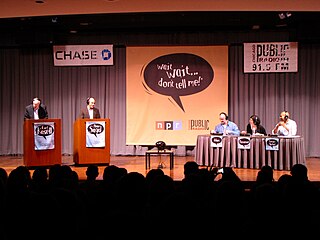
A panel show or panel game is a radio or television game show in which a panel of celebrities participate. Celebrity panelists may compete with each other, such as on The News Quiz; facilitate play by non-celebrity contestants, such as on Match Game and Blankety Blank; or do both, such as on Wait Wait Don't Tell Me. The genre can be traced to 1938, when Information Please debuted on U.S. radio. The earliest known television panel show is Play the Game, a charades show in 1946. The modern trend of comedy panel shows can find early roots with Stop Me If You've Heard This One in 1939 and Can You Top This? in 1940. While panel shows were more popular in the past in the U.S., they are still very common in the United Kingdom.

Pyramid is an American game show franchise that has aired several versions domestically and internationally. The show was developed by Bob Stewart. The original series, The $10,000 Pyramid, debuted on CBS on March 26, 1973, and spawned seven subsequent Pyramid series. Most later series featured a full title format matching the original series, with the title reflecting an increasing top prize. Two teams, each consisting of a celebrity and contestant, attempt to convey mystery words and phrases within a common category, against a time limit, to win cash and prizes. The title refers to the show's pyramid-shaped gameboard, featuring six categories arranged in a triangular fashion. The various Pyramid series have won a total of nine Daytime Emmys for Outstanding Game Show, second only to Jeopardy!, which has won 13.
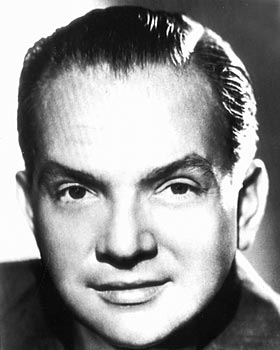
Mark Leo Goodson was an American television producer who specialized in game shows, most frequently with his business partner Bill Todman, with whom he created Goodson-Todman Productions.
To Tell the Truth is an American television panel show. Four celebrity panelists are presented with three contestants and must identify which is the "central character" whose unusual occupation or experience has been read aloud by the show's host. When the panelists question the contestants, the two impostors may lie whereas the "central character" must tell the truth. The setup adds the impostor element to the format of What's My Line? and I've Got a Secret.

Password is an American television game show. Two teams, each composed of a celebrity and contestant, attempt to convey mystery words to each other using only single-word clues, in order to win cash prizes.
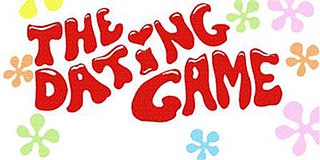
The Dating Game is an American television game show that first aired on December 20, 1965, and was the first of many shows created and packaged by Chuck Barris from the 1960s through the 1980s. ABC dropped the show on July 6, 1973, but it continued in syndication for another year (1973–1974) as The New Dating Game. The program was revived three additional times in syndication afterward, with the first from 1978 to 1980 as The All-New Dating Game, the second from 1986 to 1989, and the third from 1996 to 1999.
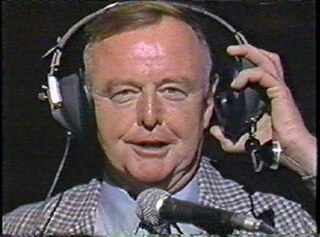
Eugene Edward Wood was an American television personality, known primarily for his work as an announcer on various game shows. From the 1950s to the 1990s, he announced many game shows, primarily Mark Goodson–Bill Todman productions such as Family Feud, Classic Concentration, Card Sharks, Password, and Beat the Clock. Wood also served a brief stint as a host on this last show, and on another show, Anything You Can Do. After retiring from game shows in 1996, Wood worked as an announcer for the Game Show Network until his retirement in 1998.

The Match Game-Hollywood Squares Hour is an American television panel game show that combined two panel games of the 1960s and 1970s – Match Game and Hollywood Squares – into an hour-long format.
Greg Evans is an Australian radio and television presenter, currently based in Melbourne. He is also a popular marriage celebrant, continuing on from his hosting of the matchmaking television game show, Perfect Match Australia in the 1980s.
Jimmy Hannan was an Australian radio and television personality, variety show host, singer, entertainer and game show host of the 1960s and 1970s. One of the pioneers of television, he appeared regularly on variety show In Melbourne Tonight, and later hosted his own musical variety show Jimmy, later called Tonight with Jimmy Hannan. Hannan hosted music show Saturday Date from 1963 until 1967, which featured such performers as Billy Thorpe and Olivia Newton-John. He won the 1965 Gold Logie award for most popular personality on Australian television.
Heatter-Quigley Productions was an American television production company that was launched in 1960 by two former television writers, Merrill Heatter and Bob Quigley. After Quigley's retirement, the company became Merrill Heatter Productions.
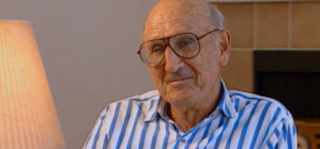
Bob Stewart was an American television game show producer. He was active in the TV industry from 1956 until his retirement in 1991.
20 to One is an Australian television series on the Nine Network from 2005, that counts down an undefined "top 20" of elements or events of popular culture, such as films, songs, or sporting scandals. The format mixes archival footage of the listed events with comments from various Australian celebrities.

WCWA is a radio station licensed to and serving Toledo, Ohio, airing a sports format. Owned by iHeartMedia, it is the Toledo affiliate for Fox Sports Radio, and the city's second-oldest radio station.
Stewart Television was an American game show production company formed by Bob Stewart in 1964 originally based in New York City.
All-Star Squares is the Australian adaption of the American game show Hollywood Squares that aired on the Seven Network in 1999, hosted by Ian 'Danno' Rogerson. Like the American version, the object of the game was to get three stars in a row, either across, up-and-down or diagonally. The contestant in turn, chose a celebrity, to whom host Rogerson asked a question. After (usually) a joke answer, they gave a response, to which the contestant either agreed or disagreed. If correct in their judgement, they received their mark in that box; if wrong, their opponent got the square.
Merrill Gabriel Heatter was an American television producer and writer. He was best known for his collaboration with writer Bob Quigley for over 20 years and the formation of their production company Heatter-Quigley Productions in 1960. The company was responsible for the game shows Hollywood Squares and Gambit and the animated television series Wacky Races.
References
- ↑ "Personality Squares". Nostalgia Central. Archived from the original on 12 August 2019. Retrieved 5 June 2019.
- ↑ "Celebrity Squares". Nostalgia Central. Archived from the original on 3 August 2020. Retrieved 5 June 2019.
- ↑ Hall, Stephen (23 January 2018). "'Aaaall…. All Star Squares! The fun and the laughter, forget all your cares!'". How To Win Game Shows. Archived from the original on 5 June 2019. Retrieved 5 June 2019.